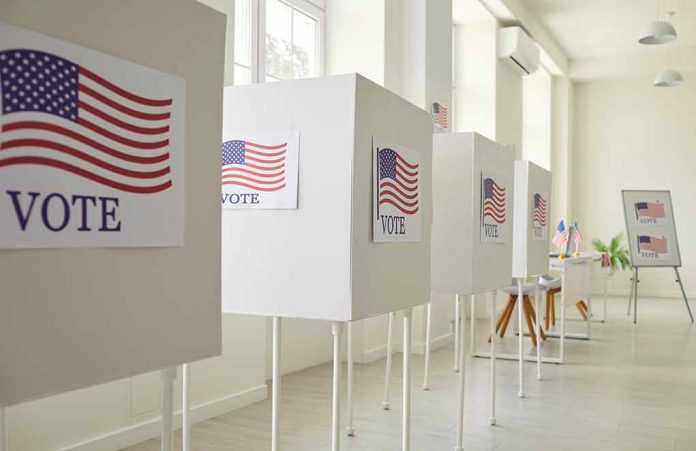
Wisconsin communities are voting to remove ballot drop boxes, citing election security concerns and sparking debate over voting integrity.
At a Glance
- Brookfield and New Berlin have banned ballot drop boxes for the upcoming general election
- The decision follows a Wisconsin Supreme Court ruling allowing municipalities to use drop boxes
- Supporters argue drop boxes are unnecessary and resource-intensive
- Critics say drop boxes benefit elderly, disabled, and single-parent voters
- The debate reflects ongoing national concerns about election security and voter access
Communities Take Action Against Ballot Drop Boxes
In a move reflecting growing concerns over election security, city councils in Brookfield and New Berlin, both located in Waukesha County, Wisconsin, have voted to ban ballot drop boxes for the upcoming general election. This decision comes in the wake of a state Supreme Court ruling that reinstated municipalities’ right to use ballot drop boxes, highlighting the tension between local autonomy and statewide election policies.
The ban on drop boxes in these communities is not an isolated incident but part of a broader trend in Wisconsin and across the nation. It reflects a growing debate over the best methods to safeguard elections against potential fraud while ensuring that all votes are counted fairly and accurately.
Arguments For and Against Drop Boxes
Proponents of removing ballot drop boxes argue that traditional voting methods, such as in-person and mail-in ballots, provide a higher level of reliability and transparency. Brookfield City Attorney Jenna Merten presented a compelling case for the ban, citing reduced COVID-19 threats and the availability of other voting services.
“Unlike 2020 and 2021, Covid is no longer the threat to public health that it once was, and the City is not subject to any stay-at-home or mask orders,” Brookfield City Attorney Jenna Merten wrote in a memo, adding that the city still provides ample services like extended hours for in-person absentee voting and a drive-up ballot drop off for disabled voters. “With such provisions in place, we do not think a drop box is necessary at this time.”
Merten also highlighted potential resource savings, noting that eliminating drop boxes would free up election workers from maintaining chain-of-custody logs, camera surveillance, and additional security measures. However, critics of the ban, including Nick Ramos, Executive Director of the Wisconsin Democracy Campaign, argue that drop boxes serve a crucial role in facilitating voting for certain demographics.
“They are a means to being able to help people that actually need them, like the elderly, the disabled, the single parents,” Ramos said. “People are looking to be able to use the drop boxes and they’re not using them in nefarious ways.”
The Broader Context of Wisconsin’s Election Debate
The current debate over ballot drop boxes in Wisconsin is part of a larger, ongoing discussion about election integrity and accessibility. In 2022, the Wisconsin Supreme Court initially banned the use of ballot drop boxes for absentee ballots, a decision that was later reversed. This legal back-and-forth has fueled discussions about the security and legitimacy of various voting methods.
The issue has attracted attention from national political figures, including former President Donald Trump, who used the initial ruling to question the 2020 election results. This has further intensified the debate, with some viewing the drop box issue as a litmus test for election integrity.
Looking Ahead: The Future of Voting in Wisconsin
As the debate continues, Wisconsin lawmakers are exploring ways to address concerns while maintaining voter access. Two state legislators have proposed legislation for 24/7 video surveillance of ballot drop boxes, suggesting a potential compromise between security concerns and voter convenience.
The Wisconsin Elections Commission has also issued new guidance on drop boxes, stating that voters can only return their own ballots, with exceptions for disabled or hospitalized individuals. This guidance aims to strike a balance between accessibility and security concerns.
As Wisconsin communities continue to grapple with this issue, the decisions made at the local level will likely have far-reaching implications for future elections in the state and potentially serve as a model for other states facing similar debates.
Sources:
1. Wisconsin communities say no to ballot drop boxes
2. Ballot drop box disinformation and the fight over voting in Wisconsin
3. Wisconsin’s new rules on ballot drop boxes create opportunity for election challenges, ‘vigilantes’
4. Wisconsin elections officials to discuss absentee ballot drop box rules after ruling














